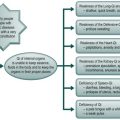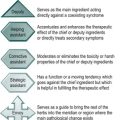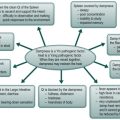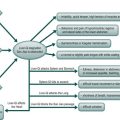10. Syndrome of Kidney-Yin deficiency
Manifestations
Main symptoms
Dizziness, tinnitus, dry throat, premature gray hair, poor concentration, forgetfulness, weakness of the back and knees, irregular menstruation or hypomenorrhea.
Secondary symptoms
Aching of knees and heels, warm palms and soles, bone steaming, emaciation, night sweats, constipation, insomnia, menorrhagia, polymenorrhea, spermatorrhea.
Tongue
Red without coating.
Pulse
Thready, or thready and wiry, or thready and rapid, but weak in the third position.
Associated disorders in western medicine
Diabetes, Parkinson’s disease, arthritis, insomnia, hyperthyroidism, menopause syndrome, menorrhagia, polymenorrhea, infertility and habitual abortion.
Analysis of the syndrome
The Kidney-Yin is the principal Yin of the body. As it is derived from the pro-heaven-Qi, which determines the constitution and vitality of each individual, the Kidney-Yin determines the conditions, the functions and storage of the Yin of all the other Zang and Fu organs. The Kidney-Yin declines with age, but it may decline quicker than normal in some conditions such as poor constitution, chronic disease, prolonged stress, intensive study and hard work, overconsuming spicy food or taking certain medications. An overactive sexual life and having many pregnancies and labors may also consume the Kidney-Yin.
Unlike the Yin of the other organs, Kidney-Yin is divided into two parts: the thick part, the essence, which is called Jing in Chinese; the thin part, the fluid, which is called Yie.
• When the Kidney-Yin is not able to support and nourish the brain, which is considered as the sea of the marrow generated by the Kidney-essence, one may suffer from dizziness, tinnitus, poor concentration and forgetfulness.
• If the Kidney-Yin is not able to nourish the bones, one may feel weak and ache, particularly in the back, the heels and the knees.
• Yin deficiency may directly cause dryness and blood deficiency, constipation may exist and menstruation may become irregular or with little menstrual flow.
• Yin deficiency often causes empty-fire. In a severe condition, the fire may ascend and overstimulate the body fluids, essence and blood, resulting in bone steaming, hot flushes, warm palms and soles, insomnia, menorrhagia, polymenorrhea or spermatorrhea. The empty-heat may quickly consume the essence of the body and lead to loss of weight and emaciation.
• Since the Kidney and the Liver are both located in the Lower-Jiao, and the Kidney-essence and Liver-blood can change into each other, Yin deficiency of the Kidney is often accompanied by Liver-Yin deficiency, and causes corresponding symptoms.
• Kidney-Yin deficiency is often shown in a red tongue without coating and a thready and weak pulse in the third position.
Treatment principle: Nourish the Kidney-Yin and reduce the empty-fire
Herb selection principles and formula composition strategies
• First, herbs that are sweet and neutral, sweet and slightly warm, or sweet and cold, enter the Kidney and Liver meridians, and are able to tonify the Kidney-essence, the Liver-blood and the body fluids are selected.
• Along with these, it is equally important to select sweet and slightly warm herbs that can strengthen the Kidney-Yang in a small amount in the formula in order to promote Yin generation, because the Yin and Yang of the Kidney are derived from one origin and they promote each other’s development.
• Herbs that can enter the Kidney meridian, strengthen the bones and benefit the back and legs are often used.
• Herbs that reduce the empty-fire from the Kidney and descend the Liver-Yang are often used if the balance between Yin and Yang in the Lower-Jiao is severely disturbed.
• Herbs that tonify the blood can be selected as they may generate the essence and benefit the Kidney-Yin.
• Herbs that regulate the Liver-Qi are often selected as Liver-Yin deficiency commonly coexists with Kidney-Yin deficiency and frequently causes Liver-Qi stagnation.
• Herbs that regulate the Spleen-Qi and promote digestion are often used because most of the herbs that nourish the Yin and tonify the essence and blood are cloying in nature and place an extra burden on the Spleen.
Structure of the formula and selection of herbs
Chief: Nourishes the Kidney-Yin
Shu Di Huang ( Rehmanniae radix praeparata), He Shou Wu ( Polygoni multiflori radix) and Gou Qi Zi ( Lycii fructus)
These three herbs all enter the Kidney meridian. The first two are sweet and slightly warm in nature and the third is neutral. They are able to tonify the Kidney-essence and nourish the blood. They treat weakness and stiffness of the back and knees, blurred vision, poor memory, disorders of menstruation, infertility, menopause syndrome and sexual disorders caused by deficiency of Kidney-essence and blood.
Shu Di Huang is the most important herb for tonifying the blood as well as tonifying the Kidney-essence. Its function is the strongest and quickest among the herbs that tonify the Kidney-essence. Compared with He Shou Wu, Shu Di Huang has a stronger function of tonifying the essence and blood, but as it is more cloying in nature than He Shou Wu, it easily causes distension of the abdomen and reduces appetite. It is often used with Sha Ren ( Amomi xanthioidis fructus) to reduce this side effect.
He Shou Wu and Gou Qi Zi are weaker in their tonifying actions than Shu Di Huang, but they are not as cloying. They can be used for a longer period of time without bringing any extra burden to the digestion. They are commonly selected in a formula to treat chronic and moderate cases of Yin deficiency.
Nu Zhen Zi ( Ligustri lucidi fructus), Sheng Di Huang ( Rehmanniae radix) and Zhi Mu ( Anemarrhenae rhizoma)
Nu Zhen Zi is sweet and cold, and enters the Liver and Kidney meridians. It can nourish the Yin, particularly the fluid part, without any cloying effect. It is suitable for treating dizziness, tinnitus, blurred vision, weakness of the back and knees, and premature gray hair due to the Liver-Yin and Kidney-Yin deficiency. Since it is not cloying in nature, has a gentle and steady action, it can be used for a long period of time for chronic diseases. Moreover, it is also suitable in conditions where blood is deficient and there is slight heat in the blood.
Sheng Di Huang is sweet and cold, and enters the Heart, Liver and Kidney meridians. It nourishes the Yin, particularly the fluid part of these organs. It can also reduce heat and cool the blood. It is particularly suitable for conditions where the heat has injured the fluid, and not only the Kidney-Yin, but also the Heart-Yin and Liver-Yin are weakened. This manifests as restlessness, palpitations, irritability and insomnia. Sheng Di Huang is also frequently used in bleeding conditions, such as in prolonged menstrual periods or heavy menstruation.
Zhi Mu is bitter and cold, but is moist in nature. This herb principally enters the Kidney and Lung meridians and is often used to moisten dryness due to Yin consumption by heat. The symptoms are night sweats, hot flushes, constipation and dry throat and mouth.
Deputy: Strengthen the Kidney-Yang in order to generate Yin, strengthen the back and benefit to the bones
Tu Si Zi ( Cuscutae semen)
Tu Si Zi is pungent, sweet and neutral, and enters the Kidney, Liver and Spleen meridians. It is able to tonify the Kidney-Yang and essence, strengthen the back and improve the vision. As it is an effective yet gentle herb, it can be used for a reasonably long period of time.
Suo Yang ( Cynomorii caulis)
Suo Yang is sweet and warm, and enters the Kidney and Liver meridians. It is able to tonify the Kidney-Yang, and nourish the essence and blood. It can moisten the intestines and treat constipation due to Yin and blood deficiency. It is suitable for treating constipation in elderly people or people with chronic diseases.
Huai Niu Xi ( Achyranthis bidentatae radix) and Du Zhong ( Eucomniae cortex)
These two herbs can strengthen the bones and tendons and are often used for weakness of the back and legs due to Kidney deficiency. In clinical practice, they are often used for different types of arthritis, infertility, menstrual disorders and habitual miscarriage.
Assistant: Reduce empty-heat, descend the Yang and regulate the Qi movement
Huang Bai ( Phellodendri cortex)
Huang Bai is bitter and cold, drying and descending in action and direction. It can effectively reduce the empty-fire of the Kidney and treat the related symptoms. Since it is very bitter and cold, it cannot be used for a long period of time or in a large dosage.
Xuan Shen ( Scrophulariae radix) and Han Lian Cao ( Ecliptae herba)
These two herbs, like Huang Bai ( Phellodendri cortex), are able to reduce the heat from the Kidney, but unlike Huang Bai, they are moistening in nature and can generate the Yin fluid. Moreover, Xuan Shen and Han Lian Cao can cool the blood as well. They can be selected in the formula when the Kidney-Yin is deficient due to empty-heat, which causes hot flushes and heavy menstruation.
Sha Ren ( Amomi xanthioidis fructus)
Sha Ren is pungent and warm, and enters the Spleen and Kidney meridians. It specifically removes the turbid dampness in the Lower- and Middle-Jiao. At the same time, it can promote the Qi movement, reduce distension and improve appetite. It is often used for reducing the cloying nature of tonifying herbs, such as Shu Di Huang ( Rehmanniae radix praeparata).
Fu Ling ( Poria)
Fu Ling is bland and neutral. It cannot promote Qi movement but is able to leach out dampness from the Lower-Jiao. As its action has a downward tendency, this herb can be used for reducing the side effects of the cloying nature of tonifying herbs. Moreover, it can slightly tonify the Spleen-Qi and is suitable to treat distension in the abdomen.
Common accompanying symptoms and treatment
• Liver-blood and Yin deficiency: add Dang Gui ( Angelicae sinensis radix) and Bai Shao Yao ( Paeoniae radix lactiflora). Since Yin deficiency is often accompanied by blood deficiency, Dang Gui and Bai Shao Yao can be used to tonify the blood in order to tonify the Yin of the Kidney.
• Insomnia: add Suan Zao Ren ( Ziziphi spinosae semen) and Bai Zi Ren ( Platycladi semen) to nourish the Liver and Heart and calm the mind.
• Hypochondriac pain and distension caused by Liver-Qi stagnation: add Xiang Fu ( Cyperi rhizoma) to spread the Liver-Qi and Chuan Lian Zi ( Toosendan fructus) to drain the Liver-Qi and Liver-heat.
• Dizziness, tinnitus and insomnia due to Liver-Yang ascending: add Mu Li ( Ostrea concha) to descend the Liver-Yang as long as it exists in the syndrome.
Examples of classical formulas
Zuo Gui Wan (Restore the Left Kidney Pill) 
Source: Jing Yue Quan Shu 
Composition
Shu Di Huang ( Rehmanniae radix praeparata) 240 g
Gui Ban ( Testudinis carapax)** 120 g
Gou Qi Zi ( Lycii fructus) 120 g
Tu Si Zi ( Cuscutae semen) 120 g
Lu Jiao Jiao ( Cervi cornu gelatinum)** 120 g
Huai Niu Xi ( Achyranthis bidentatae radix) 90 g
Shan Zhu Yu ( Corni fructus) 120 g
Shan Yao ( Dioscoreae rhizoma) 120 g
Analysis of the formula
The famous physician Zhang Jing Yue designed this formula. It is used to treat Kidney-Yin deficiency.
The formula can be divided into several groups:
• Shu Di Huang, as chief, tonifies the essence and blood and directly treats the principal complaints.
• Gui Ban and Gou Qi Zi tonify the Yin of the Kidney, play the role of deputy and directly help the chief for the same treatment purpose.
• Tu Si Zi and Lu Jiao Jiao form another group of deputies. They can tonify the essence and Yang of the Kidney so as to stimulate the process of Yin growing.
• Huai Niu Xi, as assistant, strengthens the bones and tendons, and regulates the blood.
• Shan Zhu Yu stabilizes the Yin of the Liver and Shan Yao stabilizes the Yin of the Spleen. They act as assistants to help the chief and deputy herbs to make the formula more effective and more comprehensive in nourishing and stabilizing the Yin.
Commentary on strategies
The strategy in this formula is shown in the composition to indirectly tonify the Yin. Tu Si Zi and Lu Jiao Jiao are used to tonify the essence and Yang of the Kidney in order to stimulate the process of Yin growing.
In this formula, there is no herb to regulate the Qi and reduce the cloying nature of the tonifying herbs. This shows the philosophy of Zhang Jing Yue in using herbs – clear, intense and focused on the main syndrome. Zhang Jing Yue believed that if a clear diagnosis of Kidney-Yin deficiency is made and if the Yin deficiency is predominant in the whole pathological process, a practitioner should use powerfully and sufficiently tonifying herbs in the formula without any hesitation. He explained this as follows: ‘If there is no rain for three years and the land is very dry, one should not be afraid of a heavy rain, and should not dig a ditch to let the water flow away.’ On the other hand, in clinical practice, particularly in conditions of the Spleen deficiency, herbs that regulate the Qi and eliminate dampness should be applied.
Er Zhi Wan (Two-Ultimate Pill) 
Source: Yi Fang Ji Jie 
Composition
Nu Zhen Zi ( Ligustri lucidi fructus) 9 g
Han Lian Cao ( Ecliptae herba) 9 g
Analysis of the formula
This formula consists of only two herbs. It treats Liver-Yin and Kidney-Yin deficiency that manifest as dizziness, tinnitus, blurred vision, dream-disturbed sleep, dry mouth and throat, weakness of the back and knees, and premature gray hair.
• Nu Zhen Zi is sweet, bitter and cold, and particularly nourishes the Yin fluid of the Kidney and Liver.
• Han Lian Cao is sweet, sour and cold, and is able to clear the heat, cool the blood, stop bleeding and nourish the Yin fluid.
Commentary on strategies
• This formula is particularly suitable in conditions where Yin is deficient with slight heat at the Yin or blood levels.
• The strong point of this small formula is that it has no cloying side effect and has a gentle and steady action, thus it can be used for a long period of time for chronic diseases.
• This formula is often added to other formulas in order to gently and effectively tonify the Kidney-Yin and Liver-Yin without side effects.
Da Bu Yin Wan (Great Tonify Yin Pill) 
Source: Dan Xi Xin Fa 
Composition
Shu Di Huang ( Rehmanniae radix praeparata) 180 g
Gui Ban ( Testudinis carapax)** 180 g
Huang Bai ( Phellodendri cortex) 120 g
Zhi Mu ( Anemarrhenae rhizoma) 120 g
Rice wine, cooked pig marrow, honey and salt are mentioned in preparation and usage in the source book without dosages.
Analysis of the formula
This formula is used to treat a syndrome of Kidney-Yin deficiency with empty-fire. The patient suffers from bone steaming, afternoon fever, night sweats, spontaneous emissions, weakness of the back and knees, and irritability. A red tongue without coating and a rapid, forceful pulse in the Kidney positions are often found.
In this formula:
• Shu Di Huang, as chief, can directly tonify the essence, the Yin of the Kidney.
• Gui Ban and pig marrow act as deputies. They are animal products and can tonify the Yin and essence strongly and quickly. They strengthen the function of the chief.
• Zhi Mu and Huang Bai also act as deputies. They can directly clear the heat, reduce the empty-fire in the Lower-Jiao and directly relieve bone steaming, afternoon fever and night sweats.
• Alcohol is considered as an assistant. It moves quickly, and is used to process Shu Di Huang and pig marrow in order to reduce their cloying nature. It is also used to process Zhi Mu so as to reduce its cold nature, which may injure the Kidney-Yang.
• Honey is used for harmonizing the herbs in the formula and serves as envoy.
• Patients are advised to take the herbal pill with lightly salted water because salt can lead the rest of the ingredients to enter to the Lower-Jiao; for this reason, it is also considered to serve as envoy.
Commentary on strategies
• Using strong tonifying and strong reducing herbs together are the characteristics of this formula. The effect is just like its name – great tonify Yin pill.
• Rice wine, cooked pig marrow, honey and salt are mentioned in the preparation and administration of use. They suggest consideration of a balance in this formula.
Liu Wei Di Huang Wan (Six-Ingredient Pill with Rehmannia) 
Source: Xiao Er Yao Zheng Zhi Jue 
Composition
Shu Di Huang ( Rehmanniae radix praeparata) 24 g
Shan Zhu Yu ( Corni fructus) 12 g
Shan Yao ( Dioscoreae rhizoma) 12 g
Fu Ling ( Poria) 9 g
Ze Xie ( Alismatis rhizoma) 9 g
Mu Dan Pi ( Moutan cortex) 9 g
Analysis of the formula
This formula was devised by Dr Qian Yi. Initially he used it to treat developmental retardation in children. Subsequently, this formula became widely used for disorders caused by Kidney-Yin deficiency in patients of different age groups.
There are six herbs in the formula, which can be divided into two groups: a tonifying group and a reducing group. Alternatively, the six herbs can be divided into three pairs, each of which contains one chief and one assistant, and these three pairs tonify the Yin of the Kidney, Liver and Spleen respectively.
In the group that plays the role of assistant in the formula, three reducing herbs are used to correct the side effects of the chief herb:
• Ze Xie eliminates the turbid water from the Kidney as Shu Di Huang has a cloying nature that may retain water in the process of tonifying the Yin.
• Mu Dan Pi eliminates constrained heat from the Liver because the sour and warm Shan Zhu Yu may generate and keep restrained heat in the Liver in the process of tonifying the Yin.
• Fu Ling may remove dampness from the Middle-Jiao as the astringent Shan Yao may retain dampness.
Commentary on strategies
• This formula nourishes the Yin of the body in a gentle and balanced way. Since the tonifying herbs bring strong and effective actions without side effects, this formula can be used for a long period of time.
• The dosage arrangement clearly indicates that the tonifying function is stronger than the reducing function. As well as tonifying the Yin of the Kidney, Liver and Spleen, this formula emphasizes tonifying the Kidney-Yin.
• Since this formula nourishes the Yin of the body in a gentle and balanced way, it is often used to improve and maintain health, and to slow down the degeneration process so as to prolong life span.





